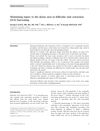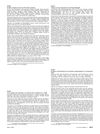 31 citations,
March 2017 in “Journal of The American Academy of Dermatology”
31 citations,
March 2017 in “Journal of The American Academy of Dermatology” Some breast cancer patients developed permanent hair loss after chemotherapy and hormonal therapy, showing patterns similar to common baldness and alopecia areata.
 13 citations,
August 2016 in “Journal of Cosmetic Dermatology”
13 citations,
August 2016 in “Journal of Cosmetic Dermatology” Using normal saline in vertical extraction for hair transplants reduces donor area injury more than acute extraction.
 98 citations,
February 2013 in “Journal of The American Academy of Dermatology”
98 citations,
February 2013 in “Journal of The American Academy of Dermatology” Dutasteride may help stabilize Frontal Fibrosing Alopecia, but more research is needed.
 67 citations,
November 2002 in “Journal of The American Academy of Dermatology”
67 citations,
November 2002 in “Journal of The American Academy of Dermatology” The document concludes that careful evaluation is key to diagnose and treat women with hair loss, with tests for thyroid, iron, and hormones as needed.
 65 citations,
November 2016 in “Journal of The American Academy of Dermatology”
65 citations,
November 2016 in “Journal of The American Academy of Dermatology” The document concludes that early recognition and treatment of primary cicatricial alopecia is crucial to prevent permanent hair loss.
 17 citations,
January 2020 in “Skin appendage disorders”
17 citations,
January 2020 in “Skin appendage disorders” Certain diets may help with hair growth in people with different types of hair loss.
1 citations,
February 2024 in “Diversity” African plants can treat hair issues and may help with diabetes.
 1 citations,
January 2021 in “Journal of the Dermatology Nurses’ Association”
1 citations,
January 2021 in “Journal of the Dermatology Nurses’ Association” The convention discussed various skin conditions and treatments, and highlighted the importance of vaccinations for patients on immune-altering medications.
 275 citations,
March 1999 in “Journal of The American Academy of Dermatology”
275 citations,
March 1999 in “Journal of The American Academy of Dermatology” Chemotherapy can cause various skin reactions, with hair loss being the most common, and proper diagnosis and treatment of these reactions are important.
 172 citations,
November 1983 in “Journal of The American Academy of Dermatology”
172 citations,
November 1983 in “Journal of The American Academy of Dermatology” Chemotherapy can cause skin problems like hair loss, mouth sores, and skin darkening, and recognizing these can affect treatment decisions.
 126 citations,
October 1983 in “Journal of The American Academy of Dermatology”
126 citations,
October 1983 in “Journal of The American Academy of Dermatology” Isotretinoin effectively treats severe acne and similar conditions, but has common, mostly reversible side effects, requiring careful patient monitoring.
 56 citations,
January 2013 in “International journal of trichology”
56 citations,
January 2013 in “International journal of trichology” Zinc supplements may be needed to treat hair loss in hypothyroidism.
 41 citations,
June 2018 in “Journal of The American Academy of Dermatology”
41 citations,
June 2018 in “Journal of The American Academy of Dermatology” Some treatments for folliculitis decalvans work well, with tetracyclines and a mix of rifampicin and clindamycin being most effective.
 15 citations,
January 2019 in “Journal of the Formosan Medical Association”
15 citations,
January 2019 in “Journal of the Formosan Medical Association” Adalimumab helped control a child's severe eye disease when other treatments failed.
15 citations,
January 2015 in “Skin Appendage Disorders” Increased scalp sweating in frontal fibrosing alopecia may be linked to local skin inflammation.
13 citations,
January 2018 in “International Journal of Trichology” Intralesional triamcinolone injections can effectively stop frontal fibrosing alopecia with minimal side effects.
 12 citations,
April 2008 in “Indian Journal of Dermatology”
12 citations,
April 2008 in “Indian Journal of Dermatology” There's no significant relationship between hair loss (androgenetic alopecia) and demodex infestation.
 7 citations,
August 2021 in “Journal of the European Academy of Dermatology and Venereology”
7 citations,
August 2021 in “Journal of the European Academy of Dermatology and Venereology” Early treatment of fibrosing alopecia in a pattern distribution may improve outcomes.
 6 citations,
November 2017 in “Skin appendage disorders”
6 citations,
November 2017 in “Skin appendage disorders” Topical botanical lotion increases hair density and improves quality of life in women with hair loss.
2 citations,
June 2022 in “International Journal of Molecular Sciences” Lower levels of certain genes in hair cells improve hair loss treatment outcomes.
 1 citations,
March 2023 in “Frontiers in Medicine”
1 citations,
March 2023 in “Frontiers in Medicine” Topical prostaglandin analogs may help with hair growth but more research is needed.
1 citations,
August 2021 in “Cosmoderma” Low-dose oral minoxidil is effective and well-tolerated for treating hair loss.
 1 citations,
January 2020 in “Skin appendage disorders”
1 citations,
January 2020 in “Skin appendage disorders” Finasteride may help treat frontal fibrosing alopecia, but more research is needed.
 May 2024 in “Journal of Education, Health and Sport”
May 2024 in “Journal of Education, Health and Sport” Current treatments for folliculitis decalvans include antibiotics, isotretinoin, and potential new therapies like botulinum toxin A and PRP.
 January 2024 in “Journal of Natural Remedies”
January 2024 in “Journal of Natural Remedies” Solanum nigrum extract may help regrow hair.
May 2023 in “Journal of Drugs in Dermatology” REVIVV® serum improves hair growth and reduces shedding in androgenetic alopecia.
 May 2018 in “Journal of dermatology and dermatitis”
May 2018 in “Journal of dermatology and dermatitis” PRP is a promising treatment for autoimmune hair loss but its exact workings are not fully understood.
 September 2017 in “Journal of Investigative Dermatology”
September 2017 in “Journal of Investigative Dermatology” Researchers created human cells that can turn into sebocytes, which may help study and treat skin conditions like acne.
 September 2015 in “Actas Dermo-Sifiliográficas”
September 2015 in “Actas Dermo-Sifiliográficas” People with advanced chronic kidney disease often have skin problems, which can be treated with various medications and procedures to improve their quality of life.
 February 2010 in “Journal of The American Academy of Dermatology”
February 2010 in “Journal of The American Academy of Dermatology” Alopecia areata has different forms and can significantly affect quality of life, especially in more severe cases.























